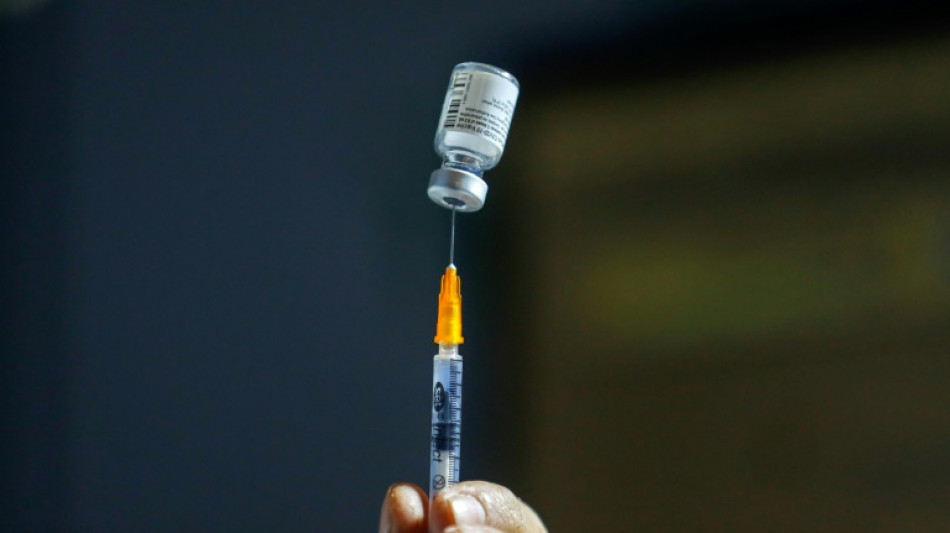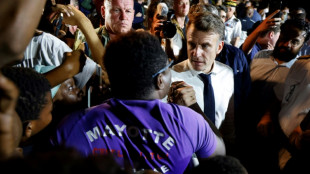
-
 Luxury Western goods line Russian stores, three years into sanctions
Luxury Western goods line Russian stores, three years into sanctions
-
Wallace and Gromit return with comic warning about AI dystopia

-
 Philippine military says will acquire US Typhon missile system
Philippine military says will acquire US Typhon missile system
-
Afghan bread, the humble centrepiece of every meal

-
 Honda and Nissan expected to begin merger talks
Honda and Nissan expected to begin merger talks
-
'Draconian' Vietnam internet law heightens free speech fears

-
 Israeli women mobilise against ultra-Orthodox military exemptions
Israeli women mobilise against ultra-Orthodox military exemptions
-
Asian markets track Wall St rally as US inflation eases rate worries

-
 Tens of thousands protest in Serbian capital over fatal train station accident
Tens of thousands protest in Serbian capital over fatal train station accident
-
Trump vows to 'stop transgender lunacy' as a top priority

-
 Daniels throws five TDs as Commanders down Eagles, Lions and Vikings win
Daniels throws five TDs as Commanders down Eagles, Lions and Vikings win
-
'Who's next?': Misinformation and online threats after US CEO slaying

-
 Only 12 trucks delivered food, water in North Gaza Governorate since October: Oxfam
Only 12 trucks delivered food, water in North Gaza Governorate since October: Oxfam
-
Melrose Group Publicly Files Complaint to the Ontario Securities Commission

-
 Langers edge Tiger and son Charlie in PNC Championship playoff
Langers edge Tiger and son Charlie in PNC Championship playoff
-
Explosive batsman Jacobs gets New Zealand call-up for Sri Lanka series

-
 Holders PSG edge through on penalties in French Cup
Holders PSG edge through on penalties in French Cup
-
Slovak PM Fico on surprise visit to Kremlin to talk gas deliveries

-
 Daniels throw five TDs as Commanders down Eagles
Daniels throw five TDs as Commanders down Eagles
-
Atalanta fight back to take top spot in Serie A, Roma hit five

-
 Mancini admits regrets over leaving Italy for Saudi Arabia
Mancini admits regrets over leaving Italy for Saudi Arabia
-
Run machine Ayub shines as Pakistan sweep South Africa

-
 Slovak PM Fico on surprise visit to Kremlin
Slovak PM Fico on surprise visit to Kremlin
-
Gaza rescuers say Israeli strikes kill 35

-
 'Incredible' Liverpool must stay focused: Slot
'Incredible' Liverpool must stay focused: Slot
-
Maresca 'absolutely happy' as title-chasing Chelsea drop points in Everton draw

-
 Salah happy wherever career ends after inspiring Liverpool rout
Salah happy wherever career ends after inspiring Liverpool rout
-
Three and easy as Dortmund move into Bundesliga top six

-
 Liverpool hit Spurs for six, Man Utd embarrassed by Bournemouth
Liverpool hit Spurs for six, Man Utd embarrassed by Bournemouth
-
Netanyahu vows to act with 'force, determination' against Yemen's Huthis

-
 Mbappe back from 'bottom' as Real Madrid down Sevilla
Mbappe back from 'bottom' as Real Madrid down Sevilla
-
Ali hat-trick helps champions Ahly crush Belouizdad

-
 France kept on tenterhooks over new government
France kept on tenterhooks over new government
-
Salah stars as rampant Liverpool hit Spurs for six

-
 Syria's new leader says all weapons to come under 'state control'
Syria's new leader says all weapons to come under 'state control'
-
'Sonic 3' zips to top of N.America box office

-
 Rome's Trevi Fountain reopens to limited crowds
Rome's Trevi Fountain reopens to limited crowds
-
Mbappe strikes as Real Madrid down Sevilla

-
 'Nervous' Man Utd humiliated by Bournemouth
'Nervous' Man Utd humiliated by Bournemouth
-
Pope again condemns 'cruelty' of Israeli strikes on Gaza

-
 Lonely this Christmas: Vendee skippers in low-key celebrations on high seas
Lonely this Christmas: Vendee skippers in low-key celebrations on high seas
-
Troubled Man Utd humiliated by Bournemouth

-
 2 US pilots shot down over Red Sea in 'friendly fire' incident: military
2 US pilots shot down over Red Sea in 'friendly fire' incident: military
-
Man Utd embarrassed by Bournemouth, Chelsea held at Everton

-
 France awaits fourth government of the year
France awaits fourth government of the year
-
Germany pledges security inquest into Christmas market attack

-
 Death toll in Brazil bus crash rises to 41
Death toll in Brazil bus crash rises to 41
-
Joshua bout only fight left for beaten Fury says promoter Hearn

-
 Odermatt stays hot to break Swiss World Cup wins record
Odermatt stays hot to break Swiss World Cup wins record
-
Neville says Rashford's career at Man Utd nearing 'inevitable ending'


The quest for a universal coronavirus vaccine
As vaccine makers rush to stamp out new Covid-19 variants, some scientists have set their sights higher, aiming for a universal coronavirus vaccine that could tackle any future strains and possibly even stave off another pandemic.
Since the race for a first Covid jab supercharged a new generation of vaccine technology, there have been numerous efforts to develop pan-coronavirus immunisation.
Drew Weissman of the University of Pennsylvania, who was a pioneer of the mRNA technology used in Pfizer's Covid vaccine, is leading one such project.
He said the problem with updating current vaccines to target all existing strains -- a plan announced by Pfizer earlier this month -- is that "new variants are going to appear every three or six months".
After more than two years simply trying to infect more people, he said, the virus is now starting to mutate specifically to get around the immunity gained from vaccines -- much as influenza's constant changing requires an updated shot every year.
"That makes it a little bit trickier, because now you're fighting head-to-head with the virus," Weissman told AFP.
So his team is working on a pan-coronavirus vaccine, which he said has tested well so far.
They are trying to find "highly conserved epitope sequences" -- more integral parts of the virus that cannot mutate readily because it would die without them.
But it's not going to be easy.
"We may have a universal vaccine in two or three years, but we're going to have to keep working on it and changing it over time to keep ahead of the virus," Weissman said.
- Expanding ambitions -
Covid was not the first coronavirus to jump from animals to humans this century: its older relative SARS killed nearly 800 people from 2002-2004, and the Middle East Respiratory Syndrome (MERS) followed in 2012.
When US-based biotech firm VBI Vaccines announced its pan-coronavirus project in the early days of the pandemic in March 2020, it targeted all three.
Francisco Diaz-Mitoma, VBI's chief medical officer, explained the premise by likening each antigen of their proposed vaccine to one of the three primary colours.
The firm hopes to provide antibodies not just for these three -- but also for "the various shades of orange, green, and purple found in between".
"In other words, we are trying to teach the immune system to expand upon the variations of virus it is capable of 'seeing' from the start," he told AFP.
He said VBI's vaccine had shown promising results so far -- including in bats and pangolins -- with clinical studies hoped to start in the coming months ahead of results in early 2023.
The ferritin nanoparticle vaccine effort led by Barton Haynes, director of Duke University's Human Vaccine Institute, has received funding from the US National Institute of Allergies and Infectious Diseases (NIAID).
He told AFP this vaccine, which targets SARS-like viruses but not a broader range of coronaviruses like MERS, had been shown to work well against Omicron.
- 'Leaping one step ahead' -
Pamela Bjorkman of the California Institute of Technology said a true pan-coronavirus vaccine was probably not realistic because there are so many lineages -- some which include common colds.
Her project uses a mosaic nanoparticle approach to target the B lineage of betacoronaviruses, which includes the original SARS-CoV and SARS-CoV-2, the virus that causes the disease Covid.
Bjorkman told AFP that even the "quest" for this specific lineage was comparable to the "many years of effort to make a universal influenza vaccine."
Like Haynes, she said the wide availability of a vaccine depended on how quickly they could begin human trials.
Even if none of the current pan-coronavirus vaccine projects are likely to be rolled out in the next year, their eventual arrival could change the world's relationship with Covid.
"If a pan-coronavirus vaccine is successfully able to establish a broader foundational immunity against coronaviruses, it would allow us, as a global society, to go from being one step behind, to leaping one step ahead of the pandemic," Diaz-Mitoma said.
The broadening horizons of vaccine research could also be one way Covid has forced the world to better prepare for the threat of even worse pandemics ahead.
The US-based Coalition for Epidemic Preparedness Innovations (CEPI) has earmarked $200 million (185 million euros) for pan-coronavirus research.
But it also has a $3.5 billion (3.2 billion euro) plan it hopes will help develop a vaccine targeting "the next Disease X" within 100 days of it emerging -- regardless of whether it is a coronavirus.
J.Williams--AMWN



